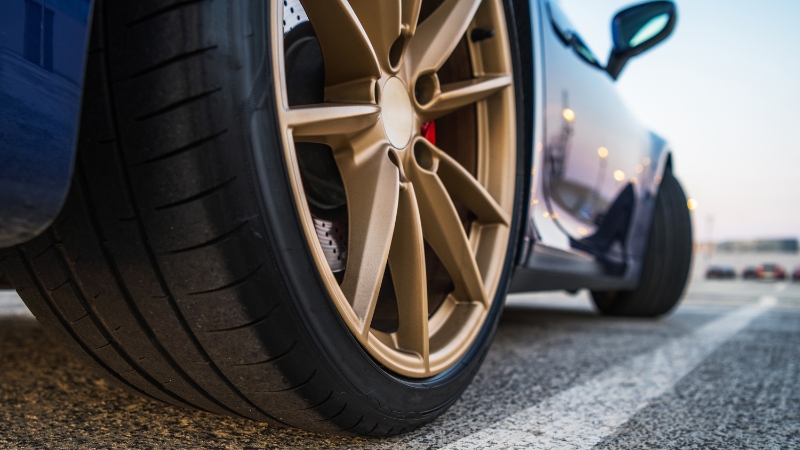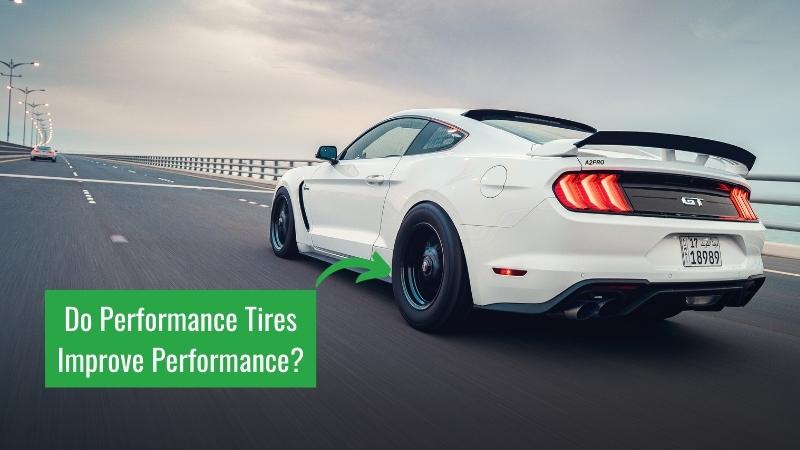When it comes to modifying your car for better performance, you might be wondering if performance tires are worth the investment.
These tires are designed to provide improved traction, handling, and stability, which can ultimately lead to a faster and more enjoyable driving experience.
However, do they actually add horsepower and torque to your vehicle? This is a question that many car enthusiasts ask.
It is important to note that performance tires do not directly increase your car’s horsepower or torque. These power figures are determined by your vehicle’s engine and transmission, not the tires. However, performance tires can certainly help to put that power to the ground more effectively.
MotorBiscuit explains that a sticky set of summer performance tires may increase the contact patch with the ground, potentially providing better grip and responsiveness during acceleration, cornering, and braking.
While performance tires won’t magically give your car more horsepower or torque, they play a crucial role in harnessing the power that is already present in your vehicle.
By offering enhanced traction and control, performance tires enable you to take full advantage of the engine’s capabilities, ultimately allowing your car to deliver faster acceleration times, higher cornering speeds, and more consistent braking performance.
What are Performance Tires?

Performance tires are specially designed to provide improved handling, grip, and traction for high-performance vehicles. These tires are made with a softer rubber compound compared to regular tires, which enables them to offer better grip on the road, particularly during high-speed cornering.
One of the key features of performance tires is their aggressive tread pattern. Unlike touring or all-season tires, performance tires have larger tread blocks and deeper grooves that help channel water away from the contact patch, reducing the risk of hydroplaning. This unique tread design is especially beneficial for maximizing grip and control in both wet and dry driving conditions.
Another notable characteristic of performance tires is their sidewall construction. These tires are built with stiffer sidewalls that help maintain the tire’s shape during cornering, improving steering response and handling. The reinforced sidewalls also contribute to providing a more stable and predictable ride, particularly during spirited driving.
It’s important to note that while performance tires can significantly enhance your vehicle’s driving capabilities, they may not be the best choice for everyday driving. Due to their softer rubber compound and aggressive tread pattern, these tires tend to wear out faster and generate more road noise compared to touring or all-season tires.
Moreover, performance tires are not designed for use in extreme winter conditions and may compromise traction on snow and ice.
When considering performance tires for your vehicle, be sure to research the best options available in the market and take into account your specific driving preferences and requirements.
Effects on Handling and Grip
Performance tires can significantly improve your car’s handling and grip, increasing your driving experience and overall road safety. The advanced compound and design of performance tires provide better traction and control, allowing you to precisely steer the vehicle, even at high speeds.
With a solid grip on the road, your car will be more responsive to your steering inputs, allowing you to corner confidently and maintain better control during sudden maneuvers.
For example, during heavy acceleration or emergency braking situations, performance tires can reduce the chances of losing control due to hydroplaning or excessive skidding. According to Forbes Wheels, some performance tires offer excellent dry road performance and extremely responsive steering.
Investing in high-performance tires can also improve the speed and acceleration of your car, as they provide a quicker response time and better stability at high speeds. As Motor Biscuit explains, better tires can have a noticeable impact on making your vehicle feel more precise and agile, thus enhancing your car’s overall performance.
However, it’s important to note that performance tires might wear out faster than standard tires due to their softer compounds designed for increased grip. So, be prepared to replace them more frequently, depending on your driving habits and conditions.
Additionally, performance tire prices may be higher than those of regular tires because they are built with high-quality materials and advanced design features to withstand intense usage and conditions.
Impact on Horsepower and Torque
When considering performance tires, it’s natural to wonder whether they can improve your vehicle’s horsepower and torque.
While performance tires don’t technically increase these engine output values, they can enhance your car’s overall performance by optimizing traction and road contact. This can result in a noticeable difference in acceleration, cornering, and overall handling.
One significant factor to consider is that performance tires are typically stickier than standard tires, which allows for better traction and more efficient power transfer from the engine to the road. In theory, a car with 10% stickier tires can lap a track faster than a car with double the torque and horsepower.
Understanding how performance tires can influence acceleration requires a closer look at the relationship between horsepower and torque. Horsepower represents the total power an engine can produce, while torque is a measure of the engine’s twisting force. Mathematically speaking, horsepower equals torque multiplied by engine RPMs, divided by 5252.
Improved traction provided by performance tires enables a vehicle to transfer torque to the road more effectively, which can result in a faster acceleration rate. Conversely, standard tires may have lower levels of traction, which can lead to power being wasted on wheel spin.
In conclusion, while performance tires don’t directly increase horsepower or torque, they can optimize your vehicle’s performance by promoting better traction and more efficient power transfer. This ultimately leads to improvements in acceleration, cornering, and overall handling.
Factors to Consider when Choosing Performance Tires
When you’re looking to enhance your vehicle’s performance, it’s essential to choose the right performance tires. Here are some factors you should consider:
Tire Size and Type: Make sure to select the correct tire size and type for your vehicle, as it ensures your tires will work efficiently and safely. To find the recommended tire size and type for your vehicle, consult your owner’s manual or the tire information placard found on the driver’s door jamb or inside the glove box.
Performance Ratings: Performance tires come with different speed ratings, which indicate the maximum speed they can safely handle. Consider the top speeds your vehicle is capable of achieving when selecting a tire with the appropriate speed rating.
Traction and Handling: Performance tires offer improved traction and handling, allowing for better grip when cornering and better responsiveness during acceleration and braking. When evaluating potential tires, look for ones that emphasize traction and handling capabilities suitable for your specific driving needs.
Weather Conditions: Consider the typical weather conditions you drive in, as performance tires can be designed for specific climates. Some are better suited for dry roads, while others work well in wet conditions. If you frequently drive in snowy or icy conditions, make sure to choose tires that are designed for winter driving.
Tread Life and Wear: Performance tires may offer varying tread life and wear characteristics. While they generally provide increased traction and handling, they might wear faster than regular tires. To make an informed decision, research the expected wear and tread life of the performance tires you’re considering.
By considering these factors, you can make an informed choice when selecting performance tires for your vehicle, allowing you to optimize your driving experience without compromising safety or tire longevity.
Potential Drawbacks
While performance tires can undoubtedly enhance your vehicle’s handling, acceleration, and braking, there are potential drawbacks to consider. Keep in mind that these tires may not be the best choice for every driver or situation.
Firstly, performance tires tend to have a shorter lifespan compared to touring or all-season tires. Their softer compounds, designed for improved grip and responsiveness, wear down more quickly. This means you might be replacing your tires more often, leading to higher long-term costs.
Additionally, performance tires may not provide the best traction in wet or slippery conditions. Although some high-performance tires offer decent wet traction, they are generally not as well-suited to handle adverse weather conditions as all-season tires. So, consider your driving environment and climate when selecting tires for your vehicle.
Another factor to consider is the decrease in ride comfort. Performance tires usually have stiffer sidewalls to enhance handling, but this can result in a less comfortable and noisier ride. If smoothness and a quiet driving experience are priorities for you, performance tires might not be the ideal choice.
Lastly, the cost of performance tires can be significantly higher than that of standard tires. If you’re on a tight budget or don’t frequently engage in spirited driving, the extra expense for performance tires might not be justified.
In summary, it’s essential to weigh the benefits and drawbacks of performance tires to determine if they are the right choice for your driving needs and preferences.
Conclusion
In conclusion, performance tires can indeed improve your car’s handling and overall performance by providing better grip and traction. However, they do not directly add horsepower and torque to your vehicle.
The benefits of using performance tires, such as a sticky set of summer performance tires or soft compound tires, are mainly derived from their ability to ensure a better contact patch with the ground under various driving conditions.
It is essential to understand that performance tires do not magically increase your car’s horsepower or torque. Instead, they improve the car’s ability to utilize its existing power in a more efficient way, by enhancing the transmission of the engine’s output to the road. This can translate into faster acceleration, improved cornering, and enhanced braking capabilities.
When considering performance tires for your vehicle, keep in mind that they are just one aspect of improving its performance. There are various other factors to consider, such as suspension, brakes, or engine modifications.
However, investing in a quality set of performance tires is a relatively simple and effective way to make the most out of your car’s existing capabilities.
Hi, my name is Niklas, the head content creator & CEO of Whirling Wheelz. I am very interested in vehicles of all kinds, mainly cars. I have a car mechanics degree from high school and a big hobby of mine is to follow the WRC (World Rally Championship) both online and through travel.


